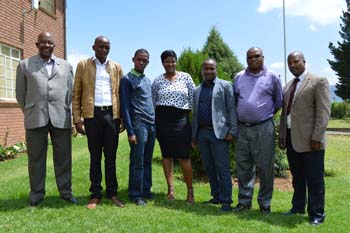 |
The quest for producing well-grounded, excellent and prolific teachers at the UFS is bearing fruit. Numerous accolades have over the years been bestowed on some of the UFS Qwaqwa Campus's finest graduates.
"For us as the faculty, it is gratifying and rewarding to learn about the achievements of our students. These achievements do not only validate our efforts, but inspire us as well,” says Dr Dipane Hlalele, Assistant Dean in the Faculty of Education at the UFS.
Dr Hlalele also revealed that, in the recent past, the faculty at the Qwaqwa Campus has experienced an increase in the enrolment figures for teacher training.
"Numbers in our initial teacher education programmes grow in leaps and bounds and we produce some of the best teachers in the country. We are proud to say that on graduation day, our students receive at least two things, i.e., their qualifications as well as entry into the teaching profession," added Hlalele.
Some of the shining examples that Dr Hlalele referred to, are Tebello Tshabalala (English), Mthobisi Khumalo (Mathematics), Thabo Mohapi (Physical Sciences), Lehlohonolo Khanye (Accounting) and Yvonne Tsotetsi (Business Studies). All of these are educators at Lekgulo Senior Secondary School in Qwaqwa and have each produced a 100% pass rate in the 2014 examinations.
There is also Nape Motloung, whose excellent Mathematics results at Botshabelo's Lefikeng High School have placed him as the Top Mathematics Educator in the Free State. Motloung's consistent excellent results have also placed his school in the Top 10 of the Best Performing Schools in Mathematics. This has also won his school R100 000 from the Free State Department of Education.
At yet another Qwaqwa school, Sekgutlong Secondary, Malefetsane Mokomotoane's Mathematics results over the years have earned him a runner-up prize in the category Excellence in Teaching Mathematics at the 2014 National Teachers Awards hosted by Minister Angie Motshekga.
"I am proud to have had 98% of my learners pass Mathematics, with 10 distinctions," said an elated Mokomotoane, who has just been appointed Principal of Selelekela Secondary School in Qwaqwa.
"Having achieved an average of 59%, my highest ever, has taught me and my learners that through hard work, anything is possible," added Mokomotoane.